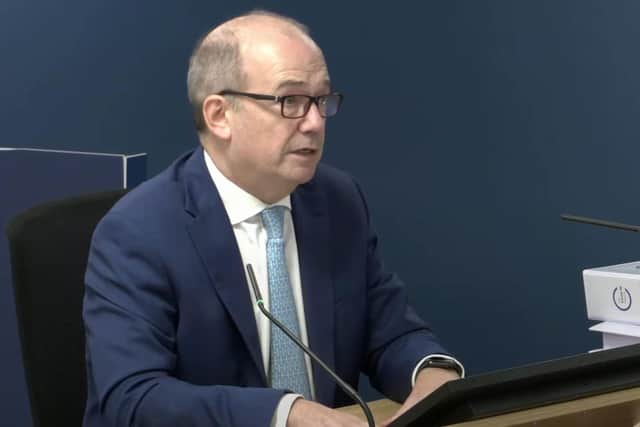Pandemic planning resources ‘diverted’ to Brexit preparations – NI medical chief Sir Michael McBride tells UK Covid-19 Inquiry
and live on Freeview channel 276
Sir Michael McBride said the work of the Department of Health was also impacted by the lack of a Stormont Executive between 2017 and 2020.
His comments came at the UK Covid Inquiry which is examining how prepared the nation was ahead of the coronavirus pandemic which struck in early 2020.
Advertisement
Hide AdAdvertisement
Hide AdSir Michael has been Northern Ireland’s chief medical officer since 2006.


Northern Ireland was without devolved government from 2017 following the resignation of then-deputy first minister Martin McGuinness.
It was not restored until the New Decade, New Approach deal in January 2020 which put ministers in post just before the Covid pandemic hit the region.
Sir Michael described to the inquiry the structures that were in place for pandemic planning.
Advertisement
Hide AdAdvertisement
Hide AdThe Northern Ireland Pandemic Flu Oversight Group was set up in 2018 to develop surge plans in relation to secondary care and social care, following the UK’s Exercise Cygnus.
As part of this, a Task and Finish Group was asked in 2018 to review and update the health and social care influenza pandemic surge guidance.
But it was unable to finish its work when staff were diverted for Brexit planning.
“Resources were diverted to EU-exit planning,” he told the inquiry.
Advertisement
Hide AdAdvertisement
Hide Ad“The work was incidentally picked up again in January of 2020, but of course then events overtook us and in the end further work was carried out in February and we did have surge plans in place for the first wave of the pandemic.”
A lack of a health minister between 2017 and 2020 also hampered the department’s work, Sir Michael said, including the full implementation of the Bengoa Report which was designed to transform the health service.
“I think there is absolutely no doubt that the absence of ministers did have a significant impact on our ability to develop new policy,” he said.
“It has been a very challenging resourcing situation over the last decade, particularly so in Northern Ireland over the last five years, compounded by a reliance on annual budgets – so we were making decisions in terms of trying to live within budget allocations.
Advertisement
Hide AdAdvertisement
Hide Ad“We had to make savings, and obviously there is limited opportunity to make savings in health, particularly where you have got inflationary pressures of 6% per year because of technology and an ageing population and their needs.
“The resulting position was that we were having to make decisions which were not necessarily decisions that should be made but decisions that had to be made.”
Sir Michael said the health service in 2020 was “not as resilient” as it was in 2009 at the outbreak of the H1-N1 pandemic.
“The lack of structural change, which was compounded by the resourcing situation, and as I said earlier, decisions that were made to live within budget allocation as opposed to decisions that should be made, and that resulted in decisions that were short term … and likely to cost more particularly in relation to the priority that needs to be afforded public health,” he said.
Advertisement
Hide AdAdvertisement
Hide AdSir Michael stressed the importance of being able to maintain capacity.
“The temptation is always wants an emergency is over is to move on to the next set of challenges. The resourcing pressures are such that there’s a high risk that that will happen,” he said.
“This isn’t an add-on extra, what those who are experts in emergency preparedness and planning response do.
“We will need those individuals and continue to need those individuals who have those highly specialist skills and experience, and they need to be acknowledged, they need to be maintained.
Advertisement
Hide AdAdvertisement
Hide Ad“But we also need a set of generic skills right across government, in all government departments so that an effective response can be mounted and we can dial that capacity up, and we can dial it down as the need arises because unfortunately, we will not be able to maintain the level of responsiveness at the level that it currently is but we absolutely will need to be able to scale that up and very short notice when the need arises.”
Sir Michael’s appearance comes after former health minister Robin Swann gave evidence to the inquiry last week.
Mr Swann contended that years of neglect of the health service had hindered its ability to respond to the pandemic, and years of stop-start government and short-term budgets had prevented reform.
Former first minister Baroness Arlene Foster is set to appear on Tuesday, and former deputy first minister and former health minister Michelle O’Neill is to attend on Wednesday.
Richard Pengelly, a former permanent secretary at the Department of Health, is also due to give evidence this week.